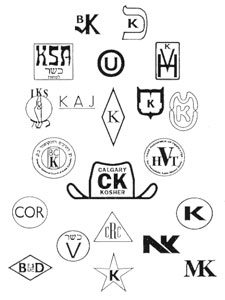Between the Leaves: December 2008
I am trying to keep a kosher diet because I think it is healthier. Do kosher teas have any more health benefits than non-kosher tea?

As you've already discovered, the gentile world largely views the kosher label as being synonymous with "healthy," and this association is not entirely incorrect. Many things that would violate the concept - such as shellfish, which are easily contaminated, and carrion, which is just gross - do have serious health concerns associated with them. However, "kosher" isn't a concept concerned with health at all. It is simply a Hebrew term that roughly translates to "correct." In fact, the only thing it really does is denote an item that passes the restrictions of kashrut, or the Jewish dietary laws. Of course, obeying these laws is, above all other things, part of religious tradition. In fact, "keeping kosher" in some sects goes beyond the religious and becomes mystic, as with Hasidic Jews who view the act of keeping kosher as one of the ways to form "sparks of Holiness" or brief, direct connections with the Divine.
Those who really keep kosher, then, do so almost exclusively because of spiritual reasons, and kosher tea is a good example of this spiritual precedence. See, the kashrut is incredibly detailed when it comes to the treatment and consumption of animal products, but has very few restrictions on plant foods. In fact, outside of some restrictions on grape products, grain during Passover, and plucking fruit from a tree less than three years of age, all fresh fruits and vegetables are considered kosher. This means that if you went to China, plucked a tea leaf, brushed off any bugs, and put it in your cup, your tea would be kosher.
Of course, there are a lot of processing steps between that fresh leaf and your standard brew, and if the leaves or their packaging come into contact with any equipment that had touched meat or dairy in any way, or if the leaves had accumulated some insects, the finished tea product would be considered non-kosher, or treif. Of course, extended processing can also render perfectly kosher tea treif, such as decaffeinating tea with ethyl acetate, a grain product, which makes the tea non-kosher during Passover. (Adagio's decaffeinated offerings are processed using the carbon dioxide method, and are likely kosher for Passover, though they are not formally certified.) Flavored teas can also pose kosher issues, as certain flavorings may not be kosher, though the tea they flavor is. Kosher certification boards, then, are most interested in flavoring and decaffeination processes. There are no kosher guidelines in regards to pesticide or fertilizer usage on the tea farms - the biggest health concern - and any inspection to ensure that other equipment and the tea itself is bug, animal, and dairy-free is, in large part, a formality.
In short, kosher for health is a great way to choose your deli, but there are better indicators when it comes to your tea.
*Special thanks to Ido Zimet of Divine Tastes for his help in this article.
